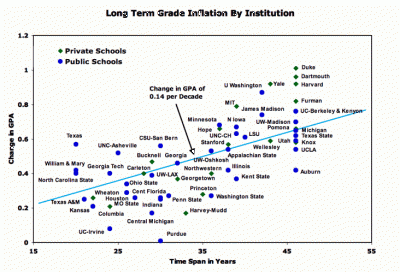College grades have apparently inflated since my college days.
An A is now the most common college grade, according to an article published last year by Professors Stuart Rojstaczer and Christopher Healy:
In 1960, 15 percent of all college grades were A's. The most common grade was a C.
In 2012, an A was the most common grade given nationally (43 percent). A's and B's together now account for 73 percent of all college grades at public universities and 86 percent of all private school grades.Arthur Levine, president of the Woodrow Wilson National Fellowship Foundation and former president of Columbia's Teachers College, similarly found:
- In 1969, seven percent of students reported an A- grade-point-average or higher.
Even at Harvard? The Harvard Crimson earlier this month says yes. In "Substantiating Fears of Grade Inflation, Dean Says Median Grade at Harvard College Is A-," it reports that at Harvard, the "most common grade is A." The story has 504 comments as of today.
- By 2009, that number had risen to 41 percent.
Rojstaczer and Healy say that student engagement has fallen and the average amount of study has declined from 24 hours a week in the '60s to 15 hours a week today.
Some universities including Columbia and Dartmouth, have begun issuing "honest transcripts", disclosing not only the letter grade the student received for each class, but also the average grade that the professor gave the entire class, thereby putting each grade in context. Thomas Lindsay reports this month (mindingthecampus.com) that a bill in Texas would require honest transcripts for students at Texas universities. .
Comments:
The "honest transcript" program has been championed by Republicans, presumably because they don't like liberal elites, even though the careers of both Bushes were assisted by these elites. Also, teachers are highly unionized and focusing on grade inflation can be seen as a way for those who criticize labor unions to demonstrate a collective laziness among students and faculty.
However, I don't know why this should be a partisan issue. As it stands, recent graduates from colleges with inflated grades can virtually all present themselves as above average among their college peers. However, honest transcripts are not a panacea:
1. Some classes are selective. The professor interviews you and decides who can take the course. In this situation, the presumption is that all the students deserve higher grades than in a less selective introductory class.
2. Some universities are more selective than others. A Harvard student is presumed to be better prepared than a second- or third-tier college. Should Harvard students be graded the same way as an unselective college?
3. Some departments are more likely to grade on a curve than others. Science and engineering, where knowledge is more easily measured, tend to grade more strictly.
4. In professional schools – business, law, medicine – grade inflation is less of a problem because professors know that the grades are directly related to a person's career and the task of sorting out the best students is taken very seriously. Being too generous to students could mean certifying people as capable of something that they are not. leading to poor clinical performance.What other considerations should be on the table?


No comments:
Post a Comment